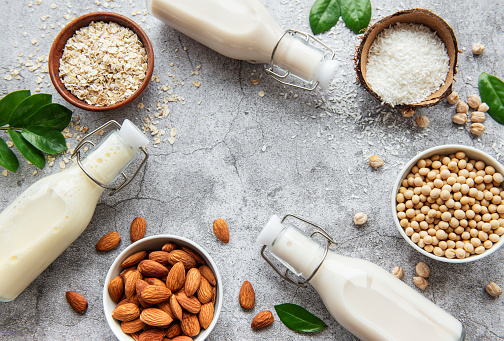A few years back, the hardest decision to make in the milk section of the dairy aisle was whether to buy reduced-fat or whole milk. Now, you can find a whole aisle of dairy-like beverages made from foods you’d never thought could be “milked” from almonds, oats, rice, and peas. Plant-based milk can be consumed independently or added to other beverages for texture and flavour, such as coffee, tea, smoothies, cereals, or granola for a cold and crunchy breakfast. Although dairy milk is still the most popular form, the demand for plant-based milk is rising. Since plant-based or vegan milk is readily available, let us know more about plant-based milk and its benefits to human health.
Plant-based milk is a lactose-free substitute for mammary milk. It is also a cruelty-free alternative to dairy milk as it is not produced by farm animals, making it vegan-friendly. In the dairy industry, animals produce milk under extreme confinement and stress, and cows are sent to the slaughterhouse to produce ground beef once their milk production declines. Therefore, plant-based milk prevents cruelty and inhumane treatment of cows. How are plant-based products “milked”? It is made by soaking the legumes, nuts, grains and other main ingredients and pressing and straining the liquid “milk”.
One might ask, what makes plant-based milk healthier than dairy milk? For one, it’s free from antibiotics or painkillers, commonly given to dairy cows. Unlike dairy milk, which is known to trigger the release of hormones that promote acne and cancer cell growth, plant-based milk is safe for all. Secondly, plant-based milk is the new hope for those who are lactose-intolerant. Dairy milk contains lactose that is poorly digested by some people, which leads to digestive problems and inflammation that may cause chronic diseases or conditions. Plant-based milk, on the other hand, is lactose-free and has good protein content.
Not many are aware of the nutritional needs that plant-based milks can fulfil. For instance, almond and coconut milk have higher amounts of vitamin E than other plant-based milks. This allows consumers to pick suitable plant-based milk that can be particularly life-changing for those with vitamin deficiencies. Plant-based milk has also received much attention from fitness enthusiasts since plant-based milk is lower in sugar and calories than dairy milk, making weight loss programmes a great hit.
Plant-based milk is a necessary substitute for dairy milk as dairy industries can cause negative environmental effects. Shockingly, the dairy milk industry uses nine times more land and releases more greenhouse gases than industries of plant-based milk despite using land to grow crops. In dairy industries, clearing land to build farms tends to cause climate change, which significantly pressures the food system. Besides, raising cattle for milk is a major contributor to greenhouse gases.
Plant-based milk shines a ray of hope on the concerns brought upon by the dairy industry. Plant-based milk is a remarkable substitute for dairy milk and a solution to fulfil the demands of a growing global population. Looking at all these benefits and positive effects of plant-based milk, one should consider consuming plant-based milk as part of their diet, in addition to its environmental benefits.




